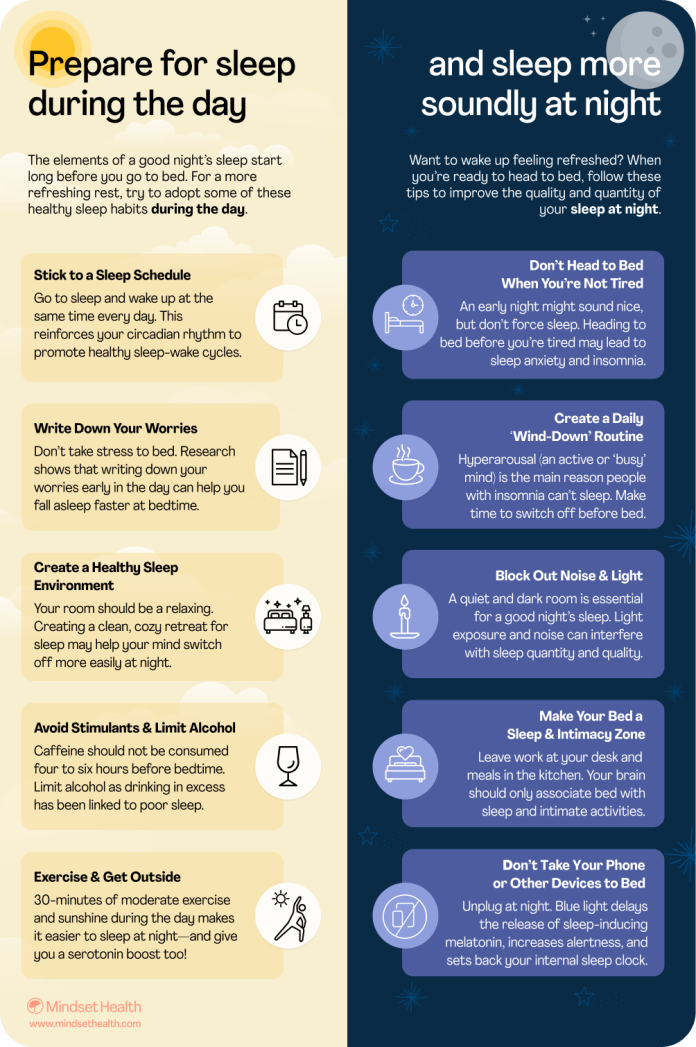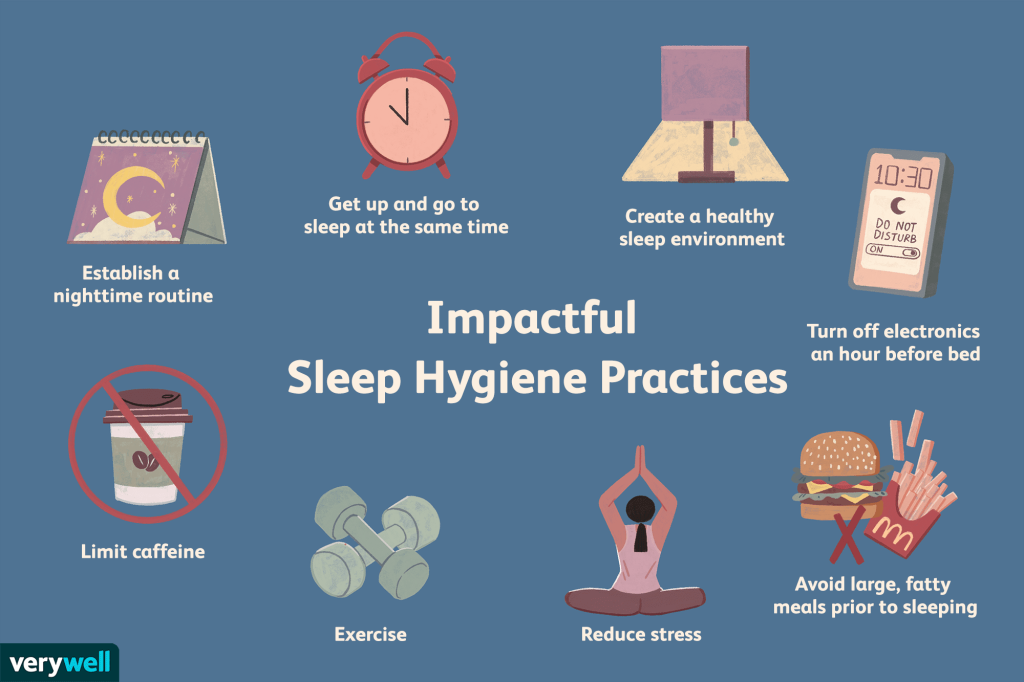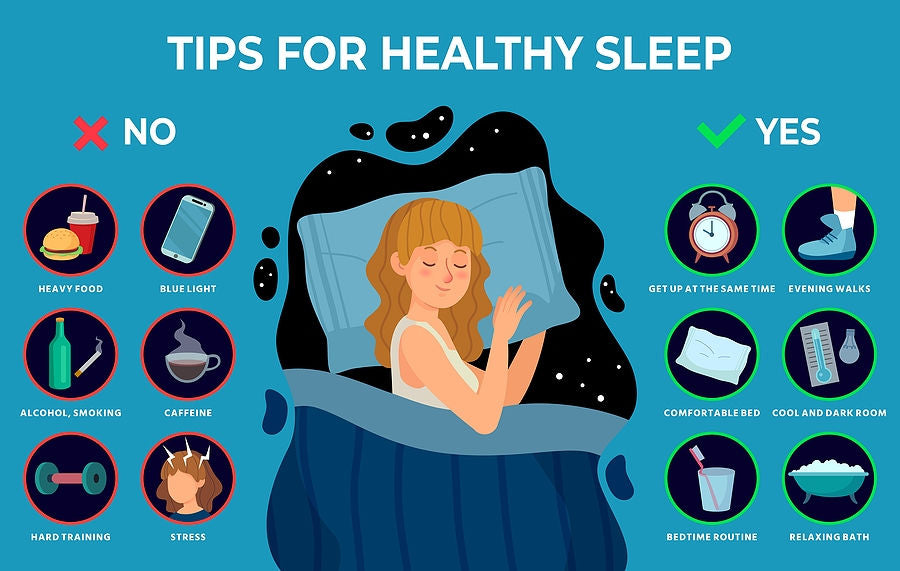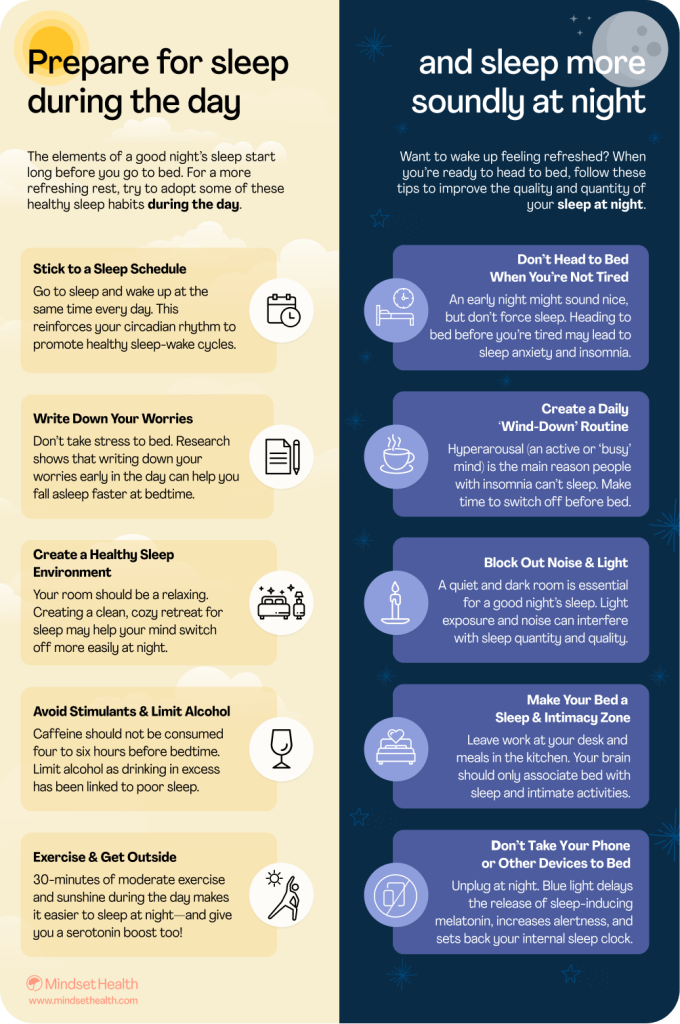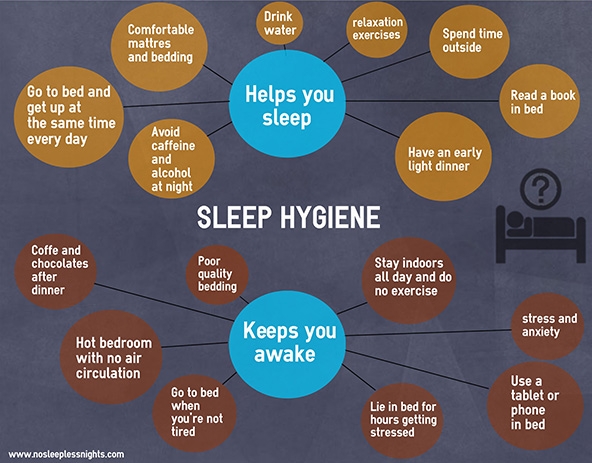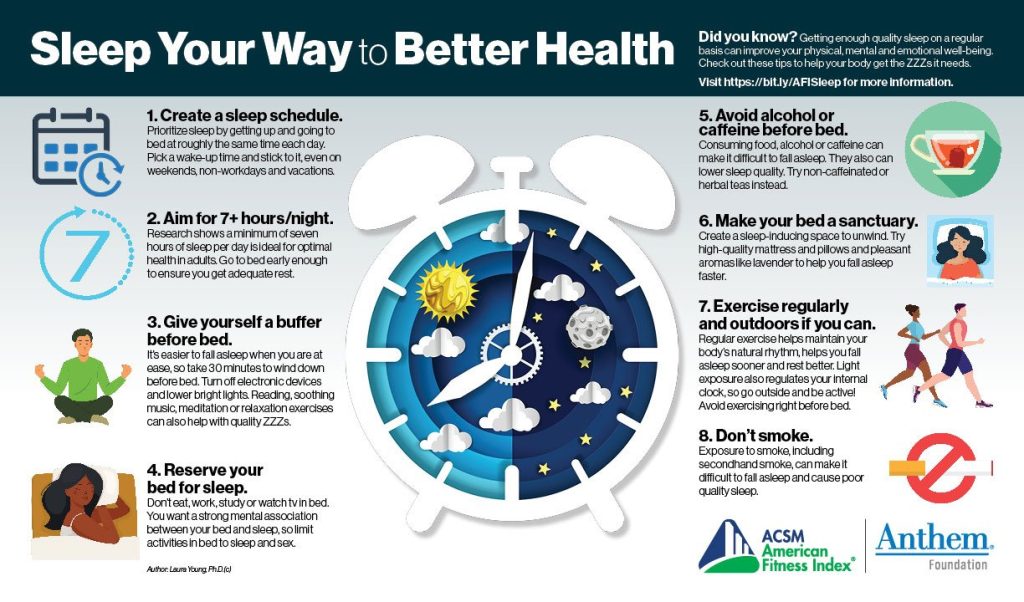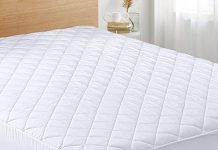If you’ve ever struggled with getting a good night’s sleep, you may have encountered the term “sleep hygiene.” But what exactly does it mean?
In simple terms, sleep hygiene refers to the practices and habits that can help promote healthy sleep.
From establishing a consistent sleep schedule to creating a calming bedtime routine, these small changes can significantly impact your overall sleep quality.
In this article, we will delve deeper into the importance of sleep hygiene and how it can positively affect your well-being.
So, if you’re ready to improve your sleep habits and wake up feeling refreshed, keep reading!
Review contents
Definition of Sleep Hygiene
What is sleep hygiene?
Sleep hygiene refers to a set of practices and habits that promote healthy sleep.
It encompasses various lifestyle choices, daily routines, and environmental factors that can significantly impact the quality and quantity of sleep you get each night.
Sleep hygiene practices
Several sleep hygiene practices can contribute to establishing a healthy sleep routine.
These practices include maintaining a consistent sleep schedule, creating a sleep-friendly environment, paying attention to diet and exercise, managing stress and anxiety, addressing sleep disorders, minimizing technology usage before bed, and recognizing the benefits of good sleep hygiene.
Importance of Sleep Hygiene
Impact on physical health
Sleep hygiene plays a crucial role in maintaining good physical health. When you consistently get enough high-quality sleep, you support your immune system, reduce the risk of chronic conditions such as obesity, diabetes, and cardiovascular disease, and enhance your body’s ability to heal and repair itself.
Effect on mental well-being
Quality sleep is essential for maintaining optimal mental well-being. Lacking sufficient sleep can lead to irritability, mood swings, and increased stress levels. On the other hand, practicing good sleep hygiene promotes emotional stability, reduces the risk of developing mental health disorders such as depression and anxiety, and enhances overall psychological resilience.
Enhanced cognitive function
Sleep hygiene is vital for supporting optimal cognitive function. When you consistently get enough restful sleep, your brain can effectively consolidate memories, process information, and make connections. Sleep hygiene improves attention span, concentration, problem-solving, and decision-making skills.
Optimized daytime performance
Sleep hygiene directly impacts your daytime performance and productivity. By prioritizing sleep and ensuring your sleep environment and routine are conducive to quality rest, you can wake up refreshed, alert, and energized.
This, in turn, promotes better focus, productivity, creativity, and overall performance in daily activities, whether it be work, school, or personal endeavors.
Creating a Sleep-Friendly Environment
Ideal bedroom conditions
Creating the ideal bedroom conditions can significantly improve your sleep quality. Ensure your bedroom is quiet, dark, and comfortably calm. Use earplugs, white noise machines, or soundproof curtains to minimize noise disruptions.
Use blackout curtains or an eye mask to block out any excess light. Additionally, a comfortable mattress and pillows can significantly enhance your sleep experience.
Optimal mattress and bedding
Choosing the right mattress and bedding promotes a restful sleep environment. Your mattress should provide adequate support and comfort to prevent tossing and turning throughout the night.
The type of bedding materials, such as sheets and pillowcases, can also influence your sleep quality. Opt for breathable, hypoallergenic materials that regulate temperature and minimize allergens.
Controlling noise and light
Controlling noise and light in your bedroom is crucial for creating a sleep-friendly environment. Consider using white noise machines, earplugs, or soundproofing techniques to reduce disruptions from external noise sources.
Use blackout curtains or blinds to block out excess light from street lamps or early morning sunlight, promoting a dark and calming sleep environment.
Temperature and ventilation
Maintaining an optimal temperature in your bedroom is essential for quality sleep. The ideal temperature for sleep is typically between 60 to 67 degrees Fahrenheit (15 to 19 degrees Celsius).
Experiment with different bedding materials and adjust the thermostat or use fans for a comfortable sleeping temperature. Ensuring proper ventilation in your bedroom also helps maintain a fresh and breathable atmosphere.
De-cluttering and organization
Keeping your bedroom neat and organized can positively impact your sleep quality. A clutter-free environment promotes a sense of calm and relaxation, allowing your mind to unwind before bed. Remove any unnecessary items from your bedroom, such as work-related materials or electronics, and create a peaceful space dedicated solely to sleep and relaxation.
Establishing a Sleep Routine
Consistent sleep schedule
Establishing a consistent sleep schedule is a fundamental component of good sleep hygiene. Try to go to bed and wake up simultaneously every day, even on weekends.
Consistency helps regulate your body’s internal clock, making it easier to fall asleep and wake up naturally. Avoid frequent changes in your sleep schedule, as this can disrupt your circadian rhythm and lead to sleep difficulties.
Pre-sleep wind-down
A pre-sleep wind-down routine can signal your body that it’s time to relax and prepare for sleep. Allocate 30 minutes to an hour before bed for calming activities such as reading, taking a warm bath, practicing relaxation techniques, or listening to soothing music. Avoid mentally or physically stimulating activities that can interfere with your ability to fall asleep quickly.
Avoidance of stimulating activities
To improve sleep hygiene, avoiding stimulating activities close to bedtime is important. Stimulating activities include intense exercise, consuming caffeine or nicotine, watching thrilling or suspenseful movies, or engaging in heated discussions or debates. These activities can elevate your heart rate, alertness, and mental arousal, making it more challenging to wind down and fall asleep.
Limiting screen time
Limiting screen time, especially in the evening, is crucial for maintaining good sleep hygiene. Electronic devices emit blue light, which can suppress melatonin production, a hormone that regulates sleep-wake cycles.
Avoid using electronic devices at least one hour before bed, or consider using blue light-blocking glasses or enabling night mode settings on your devices to minimize the impact of blue light on your sleep.
Benefits of a bedtime routine
Implementing a consistent bedtime routine can have numerous benefits for your sleep quality and overall well-being. A bedtime routine helps signal to your body that it’s time to wind down and prepares your mind and body for restful sleep.
It establishes a sense of predictability and relaxation, reducing stress and anxiety associated with sleep difficulties. A relaxing bedtime routine can include reading, mindfulness exercises, journaling, or gentle stretching.
Diet and Exercise’s Impact on Sleep
The relationship between diet and sleep
Your diet can significantly impact the quality of your sleep. Certain foods and beverages can either enhance or hinder your ability to fall asleep.
Avoid consuming large meals or spicy, fatty, or acidic foods close to bedtime, as they can cause indigestion or acid reflux. Additionally, limit your intake of stimulants such as caffeine and alcohol, as they can disrupt sleep patterns.
Foods that promote sleep
Certain foods can promote better sleep by providing essential nutrients and promoting relaxation. Incorporating foods rich in tryptophan, magnesium, calcium, and vitamins B6 and C can support the production of sleep-inducing hormones and neurotransmitters.
Sleep-promoting foods include almonds, walnuts, tart cherries, kiwi, fatty fish, warm milk, chamomile tea, and whole-grain carbohydrates.
Avoiding sleep disturbance-causing substances
Maintaining good sleep hygiene is important to avoid substances that can interfere with your sleep. Nicotine is a stimulant that can disrupt sleep patterns, so it’s best to refrain from smoking or using nicotine products close to bedtime.
Alcohol may initially make you feel drowsy, but it can disrupt your sleep cycle and reduce the overall quality of your sleep.
Physical activity’s influence on sleep
Regular physical activity is essential for achieving and maintaining good sleep hygiene. Engaging in moderate-intensity aerobic exercise, such as brisk walking or cycling, for at least 30 minutes most days a week can promote more profound, restorative sleep. Exercise increases the production of endorphins, reduces stress and anxiety, and helps regulate sleep-wake cycles.
Recommended exercise routines
When it comes to exercise and sleep, finding the right balance is crucial. Aim for regular exercise, but avoid intense workouts close to bedtime, as they can elevate your heart rate and make it challenging to fall asleep.
Instead, complete your exercise routine a few hours before bedtime to allow your body time to cool down and relax. Experiment with different types of physical activity to find what works best for you, whether it’s yoga, Pilates, jogging, or strength training.
The Role of Stress and Anxiety
Impact of stress and anxiety on sleep
Stress and anxiety can significantly interfere with sleep and undermine good sleep hygiene. When you’re experiencing high levels of stress or anxiety, your mind may race with worrisome thoughts, making it difficult to fall asleep or stay asleep throughout the night. Chronic stress can even contribute to developing sleep disorders such as insomnia.
Stress reduction techniques
Incorporating stress reduction techniques into your daily routine can improve your sleep hygiene. Practices such as mindfulness meditation, deep breathing exercises, progressive muscle relaxation, and journaling can help calm your mind and promote relaxation before bed.
Engaging in activities that you find enjoyable and de-stressing, such as listening to soothing music, practicing yoga, or taking a warm bath, can also aid in reducing stress levels.
Relaxation exercises before bed
Adding relaxation exercises to your pre-sleep routine can be especially beneficial for those struggling with stress and anxiety-related sleep difficulties.
Progressive muscle relaxation involves systematically tensing and releasing different muscle groups to induce physical relaxation. Deep breathing exercises, where you focus on slow, deep breaths, can also elicit a relaxation response and help quiet the mind before sleep.
Promoting a calm and stress-free sleep environment
Creating a calm and stress-free sleep environment is essential for good sleep hygiene. Remove any potential stressors or triggers from your bedroom, such as work-related materials, electronics, or clutter.
Consider using relaxation techniques or engaging in a calming activity before bed to transition into a more serene state. This helps prepare your mind and body for sleep, reducing anxiety and promoting peace and tranquility.
Seeking professional guidance if necessary
If stress and anxiety consistently interfere with your ability to get quality sleep, it may be beneficial to seek professional guidance.
Mental health professionals, such as therapists or counselors, can help you develop coping strategies and provide support for managing stress and anxiety.
Additionally, they can assist in addressing any underlying issues contributing to your sleep difficulties.
Hygiene and Sleep Disorders
Common sleep disorders
Sleep disorders can significantly disrupt sleep quality and duration, causing excessive daytime sleepiness and fatigue.
Some common sleep disorders include insomnia (difficulty falling asleep or staying asleep), sleep apnea (interrupted breathing during sleep), restless legs syndrome (uncomfortable sensations in the legs), and narcolepsy (excessive daytime sleepiness).
How to sleep hygiene can help
While sleep disorders often require medical intervention, implementing good sleep hygiene practices can complement the treatment of sleep disorders and improve overall sleep quality.
Following sleep hygiene recommendations, you can create an optimal sleep environment, establish a consistent sleep routine, and take control of lifestyle factors that may exacerbate sleep disorders.
Complementary therapies for sleep disorders
In addition to practicing good sleep hygiene, several complementary therapies may relieve certain sleep disorders. For instance, cognitive-behavioral therapy for insomnia (CBT-I) focuses on identifying and addressing the underlying causes of insomnia through techniques such as sleep restriction, stimulus control, and relaxation training.
Similarly, continuous positive airway pressure (CPAP) therapy is commonly used to treat sleep apnea by delivering pressurized air through a mask during sleep.
Working with healthcare professionals
If you suspect you have a sleep disorder or have persistent difficulties with sleep despite practicing good sleep hygiene, it’s essential to consult a healthcare professional.
They can accurately diagnose any underlying sleep disorders and recommend appropriate treatment options. Healthcare professionals, such as sleep specialists, can conduct sleep studies, prescribe medications if necessary, and provide guidance on optimizing your sleep hygiene routine based on your specific needs.
Technology and Sleep
Effects of technology on sleep
Technology has become integral to modern life, but it can harm sleep hygiene. The blue light emitted by electronic devices, such as smartphones, tablets, and laptops, can suppress melatonin production and disrupt your sleep-wake cycle.
Additionally, constant information and social media availability can lead to increased mental stimulation and difficulty disengaging from technology before bed.
Reducing technology use before bed
To mitigate the negative impact of technology on sleep, it’s essential to reduce technology use before bed. Establish a technology curfew by setting a specific time to power down electronic devices and avoid using them in the hour leading up to sleep.
Create a relaxing routine that replaces screen time with activities like reading a book, listening to calming music, or engaging in relaxation exercises.
Blue light exposure and sleep disruption
Blue light exposure from electronic devices can interfere with your body’s sleep-wake cycle and disrupt melatonin production.
To minimize the impact of blue light, consider using blue light-blocking glasses or enabling night mode settings on your devices. Some devices offer features like “do not disturb” or “bedtime” mode, which can automatically limit notifications and reduce brightness during designated sleep hours.
Sleep-friendly technological aids
While technology can negatively impact sleep, it can also offer sleep-friendly solutions. Sleep-tracking apps and wearable devices can help monitor your sleep patterns and provide insights into your sleep quality and habits.
Some apps and devices also offer guided meditation, relaxing sounds, or white noise to promote better sleep. However, it’s essential to use these tools mindfully and not let them become a source of additional stress or reliance.
Benefits of Maintaining Good Sleep Hygiene
Improved overall health
Maintaining good sleep hygiene has numerous positive effects on your overall health. By consistently getting enough restful sleep, you support your physical and mental well-being, strengthen your immune system, and reduce the risk of developing chronic conditions. Good sleep hygiene is a cornerstone of a healthy lifestyle.
Reduced risk of chronic conditions
Quality sleep reduces the risk of chronic conditions such as obesity, diabetes, cardiovascular disease, and mental health disorders. A consistent and healthy sleep routine supports your body’s regulatory systems, promotes healthy metabolism, and improves overall longevity.
Enhanced mood and mental health
Quality sleep is essential for maintaining an optimal mood and good mental health. By practicing good sleep hygiene, you can reduce the likelihood of experiencing mood swings, irritability, and symptoms of depression and anxiety.
A well-rested mind can better cope with stress, regulate emotions, and maintain psychological well-being.
Increased productivity and concentration
Prioritizing sleep and maintaining good sleep hygiene can have a direct positive impact on your daytime performance.
When well-rested, you experience increased concentration, improved cognitive function, enhanced memory retention, and problem-solving abilities. These benefits translate into increased productivity and efficiency in various areas of life.
Better quality of life
Ultimately, maintaining good sleep hygiene contributes to a better quality of life. When you consistently get enough restful sleep, you feel refreshed, energized, and ready to tackle the day.
You can engage in personal and social activities with enthusiasm and vitality, experience greater satisfaction in your relationships, and enjoy a more balanced and fulfilling lifestyle.
Final Thoughts
Evaluate and improve your sleep hygiene.
Take the time to evaluate your current sleep hygiene practices and identify areas for improvement. Consider gradually implementing small changes, such as establishing a consistent sleep schedule, creating a sleep-friendly environment, practicing relaxation techniques, and addressing lifestyle factors affecting your sleep quality.
Importance of prioritizing sleep
Prioritizing sleep and investing in good sleep hygiene is crucial for overall health and well-being.
Recognize the importance of sleep as an essential pillar of a healthy lifestyle and prioritize it in your daily routine. Give yourself permission to prioritize self-care and allocate sufficient time for restful sleep.
Positive impact on all aspects of life
Remember that good sleep hygiene affects not only your nightly rest but also every aspect of your life.
Maintaining healthy sleep practices can enhance physical health, mental well-being, cognitive function, and daytime performance. Good sleep hygiene sets the foundation for a happier, healthier, and more productive life.
Seeking help if experiencing sleep difficulties
If you consistently struggle with maintaining good sleep hygiene or experience ongoing sleep difficulties despite your efforts, don’t hesitate to seek professional help.
Sleep disorders and underlying health conditions may require medical intervention. Consult with a healthcare professional, such as a sleep specialist or primary care physician, who can provide guidance, support, and appropriate treatment options tailored to your needs.
In conclusion, sleep hygiene encompasses a range of practices and habits that support healthy sleep.
Understanding the importance of good sleep hygiene and implementing recommended strategies can significantly improve your sleep quality, enhance overall well-being, and enjoy the many benefits of restful sleep.

